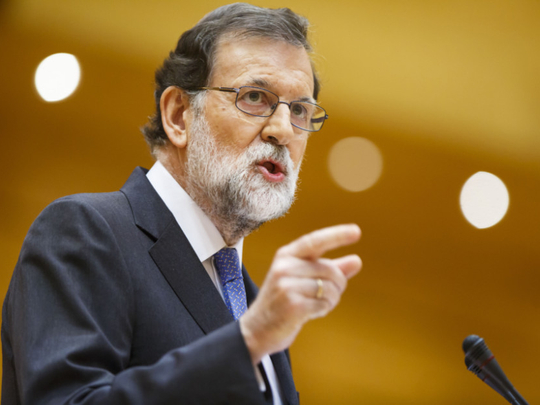
There are two wildly contradictory conceptions of Europe that manage to co-exist in current political fashion. The first, of which we hear much, is of the continent’s quite recent incarnation as an enlightened over-arching organisation: a liberal confederation of member states which transcends the old evils of nationalism and enmity, and actively repudiates its imperial past. This is, of course, the official Brussels doctrine subscribed to by most British Remainers. The New Europe is seen as the embodiment of a progressive ideal. Those who wish to declare independence from it, such as the British, or from one of its member states — such as the Catalonians — are throwbacks to a benighted (and dangerous) age in which quaint loyalties to ancient national identities divided the continent.
The other, a minority but very influential, view is that Europe as a historical entity remains a pernicious, oppressive cultural hegemony, snuffing out interest and a proper degree of respect for all those intellectual accomplishments cultivated by the former colonised races which it still implicitly regards as inferior. So there it is: Either Europe is an unmitigated force for good, spreading tolerance and social progress across old boundaries. Or else it is a vile nest of unrepentant elitists whose educational institutions breed contempt for black and ethnic communities and which must therefore be forcibly “de-colonised” to purge their racist attitudes. Bizarrely, these two views are very often held by the same people — or at least the same sort of people.
So pride in your historical identity, and the determination to preserve it, is perfectly acceptable when claimed on behalf of ex-colonial people, but it is unacceptable when it is asserted by Europeans who believe that their traditional self-determination is being trampled by the dominance of supra-national European Union (EU) institutions (in the case of Britain) or by the overweening government of an EU member state (in the case of Catalonia). As Spain was convulsed over its battle with the Catalan independence forces, the Spanish Prime Minister Mariano Rajoy made a statement that got so precisely to the heart of this that it is worth quoting in full: “The thing that Catalans need protecting from is not what they’re calling Spanish imperialism, but a minority who, in an intolerant way, declare themselves the owners of Catalonia and consider as exclusive a history, culture and feelings that are the heritage of the community.” That, indeed, is the question: Who owns your culture and your history? If you insist that you have a right to preserve it and to pass it on to future generations intact, as you have known and practised it within your borders, does that make you a nativist bigot or worse, a racial purist?
There are some perverse consequences of this odd tendency to embrace two mutually exclusive positions at the same time: It has been the orthodoxy for some years in Left-liberal circles to advocate the return of cultural artefacts to their country of origin instead of holding them in “imperialist” European museums. This argument seems to accept the “de-colonising” version of Europe as a rapacious transgressor against the historical identities of other peoples. But shouldn’t the believer in a cosmopolitan, post-nationalist world be in favour of museums which honour all cultures and allow comparative study of their works? If you are a liberal internationalist, why favour a kind of cultural ethnic cleansing in which everything has to be sent back to where it started? This is all very confusing.
That both of these ideas of Europe can be presented with equal force under the banner of metropolitan liberalism is evidence of either moral incoherence or profound intellectual dishonesty. Or maybe both — since the latter serves the purposes of the former. To attack British universities for teaching a Eurocentric curriculum — a proposition which is, at least, being considered in serious academic circles — should be an uncomfortable fit with the reverence for Europe as the enlightened leader of a new world order which is certainly the prevailing view in our universities. Rejecting European domination is an automatic good if you are descended from people who were once under its imperial rule but bad if you see yourself as subject to its new kind of excessive power. In Barcelona, the EU can justify almost any degree of authoritarian action (up to and including state violence) in shutting down a claim of “nationalist” identity. But when British academics are described as racist for concentrating their teaching on the European corpus, such comments are treated with respect rather than instantly repudiated by university authorities. (Note: in my 25 years in university life and my continuing relationship with a Cambridge college to which I am a regular visitor, I have never met a racist academic.)
There is only one thread of consistency running through all this: The perennial guilt and self-loathing that is Europe’s inescapable burden from its 19th and 20th century past. Nations that once hated one another must have peace, unity and cooperation enforced upon them. But the people that they exploited are owed endless contrition — even if it is largely meaningless. This not a political philosophy, it is a mass neurosis: an endless acting out of futile amends and apology. But ironically, the New Europe, for all its idealised talk, is as arrogantly self-regarding as ever.
It may have renounced the old forms of imperialism but its self-aggrandising spread to the East and its persistent overtures to countries like Ukraine have arguably justified Russia’s revanchist revival. So lacking in self-awareness are the spokesmen for this incoherent, illiberal mess that they are stumbling into a new wave of precisely the nationalist resentment and anger that they dread.
— The Telegraph Group Limited, London 2017
Janet Daley is a political columnist for the Sunday Telegraph. Her two novels are All Good Men and Honourable Friends.










